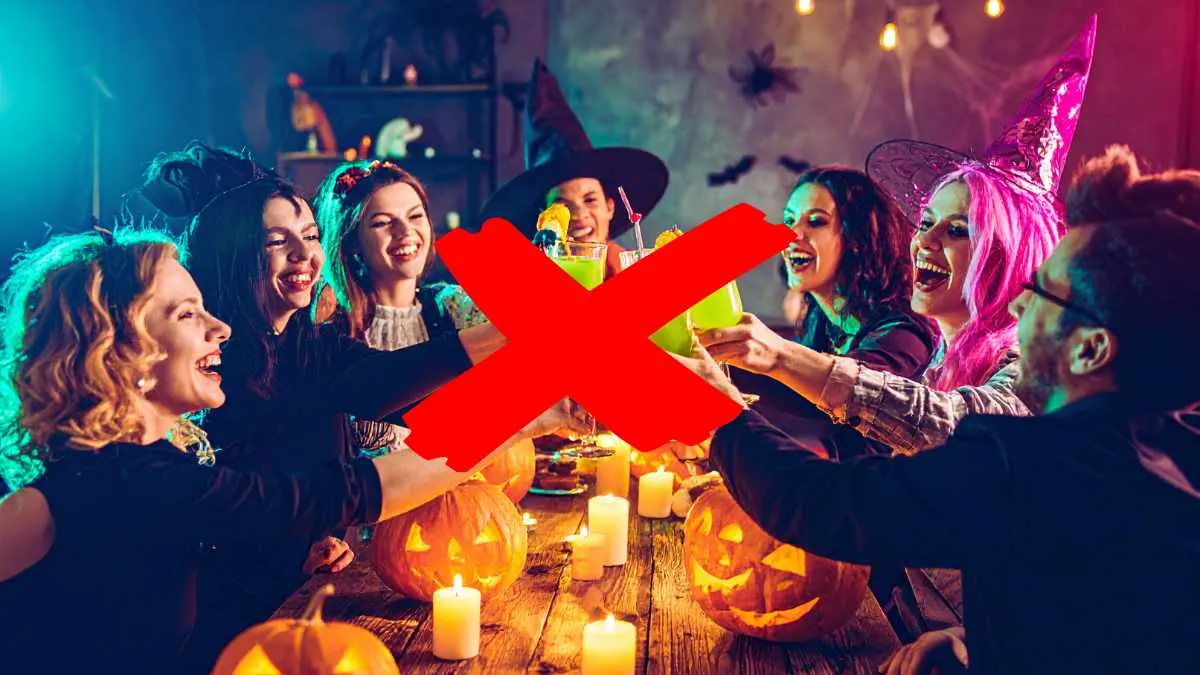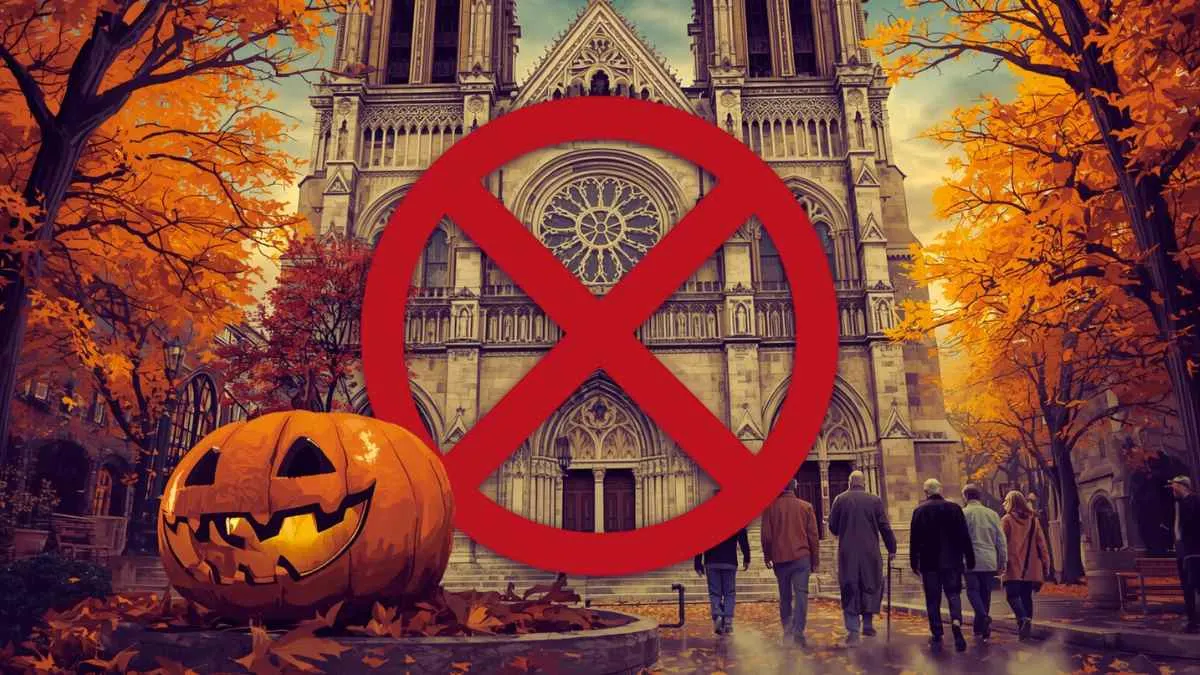Why Catholics Should Not Celebrate Halloween?
Catholic teaching urges discernment and alignment with the meaning of the preceding feast of All Saints’ Day.
Halloween — on the surface a night of costumes, candy, spooky decorations and parties — carries a deeper religious lineage as the vigil of All Saints’ Day, yet it has evolved into a cultural phenomenon hardly recognisable from its liturgical origins.
And if so, how should it be celebrated — or should it be declined altogether? In this blog post, we will explore why some Catholics argue that Halloween should not be celebrated in its current form, examine the Church’s teaching and history of the feast, and propose what faithful participation might look like.
Historical and Liturgical Foundations:
To understand the Catholic critique of modern Halloween, we must first recognise its foundation. The term “Halloween” comes from “All Hallows’ Eve,” referring to the evening before All Saints’ Day (November 1).
The Catholic Company+2Vatican News+2 The Western Church established All Saints’ Day and the vigil accordingly.
Pope Gregory III in the 8th century dedicated November 1 as the feast of all saints. CatholicWorldMission+1 This period – October 31 (vigil), November 1 (All Saints),
November 2 (All Souls) – is known as Allhallowtide, a season of remembering the saints, praying for the dead, and reflecting on the “last things” (death, judgement, heaven, hell). Wikipedia+1
Why Catholics Should Not Celebrate Halloween?

Here are the principal reasons why faithful Catholics may be advised against participating in Halloween in its typical secular form:
1. Shift from Sacred to Secular/Occult
The cultural form of Halloween has drifted far from its liturgical roots. Many celebrations emphasise ghosts, witches, demonic imagery, horror and the occult, rather than honouring saints or meditating on Christian victory over death.
Bishop David Konderla warned that when separated from Catholic teaching the holiday’s grim and ghoulish elements “can be mistaken as celebration or veneration of evil or of death itself, contradicting the full and authentic meaning of Halloween.” ewtn.co.uk The Catechism of the Catholic Church states that “all forms of divination or communications with the dead” are to be rejected. Catholic Exchange+1
2. Commercialisation and Loss of Spiritual Meaning
Halloween’s emphasis in many places is candy, costumes, consumptive culture and fear entertainment—not spiritual reflection or devotion.
Catholic commentators observe that when what began as a vigil of prayer and remembrance becomes a party of horror, the sacred purpose is eclipsed. Catholic365+1
3. Risk of Implicit Endorsement of Occult Practices
Given the widespread association of Halloween with witchcraft, horror films, haunted houses and even “summoning the dead,” some Catholics fear that participating may implicitly normalise or trivialise practices that the Church warns against.
For example, Fr. Jonathan Sawicki points out that activities like seances, faux “black masses,” or necromancy can be sinful and are clearly prohibited. The Catholic Witness
4 Confusion of Christian Identity and Witness
When Catholic families engage in Halloween in the same manner as the secular world—emphasising fear, horror or “anything goes” costumes—they risk weakening their Christian witness.
The feast is an opportunity to proclaim the light of Christ, the victory over death, and the community of saints — not to blur moral lines.
EWTN emphasises that costumes and symbols should recall mortality and Christian hope, not glorify the macabre. ewtn.co.uk
Catholic Teaching: What the Church Actually Says
It’s important to note: the Church does not categorically forbid Halloween. Rather, the doctrine emphasises discernment, avoiding evil and keeping the focus on the saints, the faithful departed, and our Christian hope.
-
The word Halloween is derived from “All Hallows’ Eve” and the vigil of All Saints’ Day. The Catholic Company+1
-
Catholic sources note that the original substance of Halloween is Catholic, but the violent, gore‑filled, occult elements now common are not true to its origins. Catholic365+1
-
The Church acknowledges that fun costumes or door‑to‑door “trick‑or‑treating” are not inherently sinful. But the celebration must avoid involvement in occult practices, glorification of evil, or moral confusion. The Catholic Witness+1
Hence, the message is: yes to remembering saints, honouring the dead, reflecting on mortality and hope in Christ; no to occult practices, glorification of evil, or secular distortion of meaning.
What’s at Stake for a Catholic Family?
For a Catholic family, several practical stakes emerge in deciding whether and how to participate in Halloween:
1. Family Spiritual Formation
If the faithful participate without reflection, kids might associate the feast with fear, horror or secular impulse, rather than Christian hope and the communion of saints. A family that uses the time only for candy and monsters may miss an opportunity for catechesis.
2. Witness to the Community
When Catholic households engage in Halloween in the same way as everyone else — filled with horror‑theme décor and occult references — it sends a confusing message. The feast of All Saints is a unique Catholic moment; diluting it undermines its distinctiveness.
3. Moral Discernment and Avoidance of Sin
Participating in activities that flirt with the occult, witchcraft, horror glorification, or mocking the sacred can mislead believers into moral confusion. The Church warns that certain practices are “grave delusions.” Catholic Exchange
Alternatives & How Catholics Can Respond:
Rather than simply rejecting Halloween outright, many clergy and Catholic writers suggest a more thoughtful approach: reclaim the vigil by transforming how it is celebrated. Some suggestions:
-
Replace horror imagery with saintly costumes:instead of ghosts and ghouls, children dress as saints or biblical characters. This shifts the emphasis from fear to witness. Catholic365+1
-
Focus on prayer and reflection: attend Mass or a vigil service; pray for the faithful departed; visit a cemetery and remember loved ones. CatholicWorldMission+1
-
Host a “saint‑party” instead of a standard Halloween party: fun activities, crafts about saints, kindness activities and liturgy. Catholic365
-
Use the feast to reinforce Catholic identity: emphasise victory over death in Christ and our call to holiness. Bishop Konderla urges that the symbols on Halloween (skulls, scythes) should remind us “we are destined for judgement… Christ has conquered death”. ewtn.co.uk
By doing this, Catholics can partake in the timing and celebrative energy of Halloween but redirect it toward meaning consistent with faith.
Read Next: Is It Safe To Go Hiking Alone As A Woman | Essential Tips
Why Some Choose to Avoid Halloween Entirely?
Even with these alternatives, many Catholics choose not to engage in Halloween at all — here are some of their reasons:
-
The secular culture of Halloween is so entrenched in fear, horror, commercialism and occult themes that it is difficult to separate harmless fun from elements in tension with the faith.
-
Families dealing with particularly vulnerable children (fearful, anxious) may find the spooky/horror aspect deeply disturbing and opt out for health and pastoral reasons.
-
Some geographic communities have very strong secular or occult‑themed Halloween celebrations (e.g., haunted houses, dark décor, parties) which make the celebration incompatible with a devout home culture.
-
Choosing to step away can itself be an act of witness — showing that the Catholic celebration of the vigil is distinct, sacred and worthy of its own rites.
FAQs:
Q1: Is Halloween inherently evil for Catholics?
No. The Church does not declare Halloween intrinsically evil. The feast has Catholic roots in the vigil of All Saints’ Day. However, the way Halloween is celebrated today often departs from its sacred meaning and can involve elements contrary to Catholic teaching. catholic.com+1
Q2: Can Catholic children go trick‑or‑treating?
Yes — the act of going door‑to‑door in costume is not automatically sinful. The key is intentions and context: avoid homes known for promoting occult or inappropriate themes; choose costumes that reflect Christian values or saints if possible. Catholic365
Q3: Are costumes and decorations always inappropriate?
Not necessarily. Costumes and decorations can be harmless or even positive when they point to saint‑ly witnesses, Christian hope, or the victory of Christ over death. What is problematic is when they glorify evil, occultism or fear for its own sake. ewtn.co.uk
Q4: What does the Church actually recommend on October 31?
The Church recommends mindfulness of the supernatural reality (saints, souls, death, judgement), prayer for the dead, attending Mass for the vigil or for All Saints/All Souls, and avoiding practices that engage in occult or superstition. The Catholic Witness
Q5: If our parish hosts a “Light Party” instead of a Halloween night, is that commendable?
Yes — many Catholic parishes now opt to replace or accompany Halloween events with “Saints’ parties,” “Light the Night” events or “All Saints Eve vigils” which redirect the focus to Christian witness and faith, making them highly commendable.
References:
-
“The Catholic roots of Halloween, the Vigil of All Saints’ Day” – Vatican News. Vatican News
-
“A Catholic’s Guide to Halloween” – The Catholic Company® blog. The Catholic Company
-
“Four Things to Know about Halloween as a Catholic” – Catholic365. Catholic365
-
“Spooky, scary, saintly? How Catholics can see Halloween at its best” – EWTN. ewtn.co.uk
-
“Trick‑or‑Treat, Cemeteries and the Faithful Departed – What Does the Church Say About Halloween?” – The Catholic Witness. The Catholic Witness

